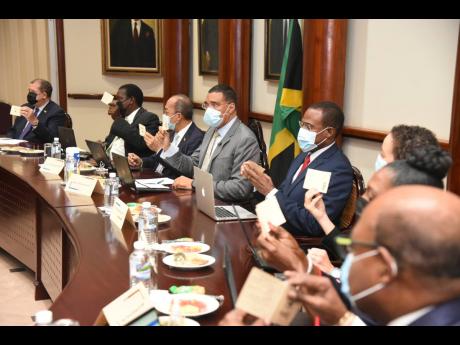Kristen Gyles | Whose Cabinet is it anyway?
What is the basis upon which people are chosen to run government ministries? We would all prefer not to assume that it is the whims and fancies of prime ministers. So what exactly is it? Quite a few politicians have got a touch of two or more ministries, with there being very little connection between said ministries. What is the great connection, for example, between the Ministry of Labour and Social Security and the Ministry of, let’s say, Education, that would allow for one person to have oversight of one ministry today and the other tomorrow?
I think a part of why we seem to consistently be having conversations about accountability, or the lack thereof within politics, is the fact that we expect people who have little or no professional competency in certain areas to be able to speak confidently about what they have to be schooled in while on the job. To make the point, it might be a bit much to expect that someone with no background in security whatsoever will just magically be able to give account for exactly why the country’s crime tactics and strategies are what they are and to also accept responsibility for the corresponding outcomes.
By now, some are thinking, “Oh another simpleton who thinks the minister of education should be a teacher and the minister of health should be a doctor”. I don’t think the minister of education needs to be a teacher, but I think the minister of education should have some experience within the education sector – walking the halls of a school somewhere, hearing the occasional long string of ‘bad words’ from a student who doesn’t realise he is being watched and hearing the bell ring at exactly 7:30 every morning like clockwork. Such an individual could be a teacher. Or a principal. Or an education officer. But not a nurse or an engineer.
PROFESSIONAL COMPETENCIES
It is unclear how much thought is given to the professional competencies of those selected for the Cabinet each election cycle. It is typically more like a choosing of the most loyal right-hand men and women, who are then given portfolios for safe-keeping. It shouldn’t be that Cabinet members are chosen and then portfolios found for them. Portfolios should be created and then fitted with experienced professionals who then, obviously, will form the Cabinet.
Unfortunately, we live in the real world and not the one of my dreams, where professional experience and no political experience is what actually befits an individual for a ministerial post. Because of this, ministers may feel they have to curry favour with their party leader (whoever he/she is) and maintain BFF status with each other in order to gain political mileage – an amazing recipe for cronyism, by the way.
Independent people who are pulled together by virtue of their competencies can form the country’s Cabinet. Nothing is wrong with unaffiliated people running the country. In fact, we need more unaffiliated people running the country. We need more people who will proffer genuine opinions that haven’t already been doctored by the political consensus of the party to which they supposedly belong.
Amid the recent fracas over the states of emergency (SOEs), which were being reimposed by the Government, the extension of the SOEs was blocked after the Opposition apparently made a decision in the spirit of togetherness to keep a united front. Thirteen government senators voted for the extension and the remaining eight opposition senators either voted against or did not show up. This happens all the time. I doubt all thirteen green-shirted senators thought genuinely that extending the SOEs was a good idea. And the eight Comrades, I’m sure, did not all truly think the blockage was best under the circumstances either. But politics. The politics we hate. Sometimes people put the interests of their parties above all else.
IMPARTIALITY AND INDEPENDENCE
I say this to say, some sense of impartiality and independence is needed. It is interesting that the people get to choose the member of parliament who will build a road or maybe a community centre over the course of five years, but yet has their community development minister decided for them. And to be clear, it is not, particularly the fact that the prime minister will choose the minister that is bothersome but the basis upon which he/she will be chosen.
Prime ministers and presidents the world over do want to have supportive teams they can trust. The same support and trust is partly why corruption prevails, however. It is more important for the country to have clear-minded and competent ministers than for the prime minister to have a loyal tribe.
In a perfect world, we could benefit from the expertise of both the JLP and PNP affiliates whose contributions we have come to value. After every election, we think the same thing: if only we could cherry-pick the ones we want and form our own Cabinet. I know, I’m a dreamer.
Such a situation would help to eliminate the need for a clumping together of four or five unrelated ministries under one broad heading. Rather than have one generalist politician who oversees gender, culture, sports, and entertainment, why not have four different specialists who can oversee each subsector? I understand that this is hard to do when you are ‘forced’ to choose from a small pool of party patriots and loyalists and when you are also trying to avoid an oversized Cabinet.
In the United States, the Senate confirms Cabinet members (by majority vote) after they are nominated by the president. Although such a confirmation is not difficult to obtain when the president’s party holds the majority of seats, it is certainly better than one in which the president (or prime minister) single-handedly chooses the Cabinet without consultation with anyone.
Kristen Gyles is a free-spirited public affairs opinionator. Send feedback to kristengyles@gmail.com.

